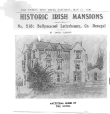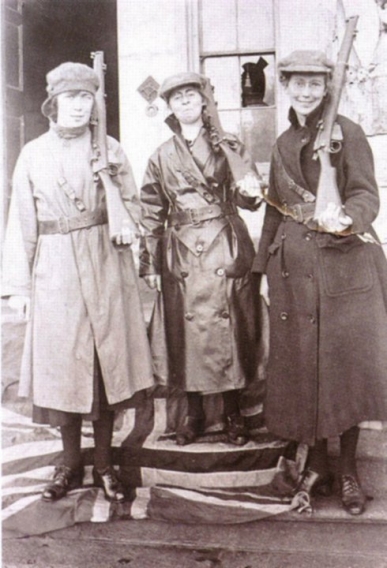During the period 1912-22, Donegal women actively participated in the events of the Irish revolution. Organisations such as Cumann na mBan played an important role in Donegal’s Civil War with members often acting as couriers and spies. Unionist women were involved in the defence of the link to Britain. During the signing of the Ulster Declaration in Donegal many lower class women marked the Declaration with an ‘X’ as they could not read or write.
Crampsie, A., A Decade of Change: Donegal and Ireland, 1912-1923 Document Study Pack (Donegal County Archive Service, 2013)
For more information on the locations in Donegal involved please see below:

Charlotte Agnes Boyd was born in Dublin. In 1873 she married William Henry Porter, nephew of John Boyd of Ballymacool, Letterkenny. Upon Boyd’s death, Charlotte and William inherited the house at Ballymacool. In order to complete the inheritance, William Henry Porter was required to adopt the surname of his late uncle. In 1891, William and Charlotte Boyd took over Ballymacool House.
The Boyds were representatives of the Protestant landed class in Donegal. As such, they became involved in the Unionist movement. Charlotte Agnes was an active member of the Ulster Women’s Unionist Council and also an organiser of the signing of the Ulster Declaration in Donegal. Throughout the campaign she ensured to include lower class unionists. Many of the forms she collected were marked with an X by unionists who were not literate.
Mrs. Boyd was also involved in other non-political organisations. She was President of the Letterkenny branch of the National Society for the Prevention of Cruelty to Children. She was also involved in a committee set up to help with Belgian refugees in County Donegal. Charlotte Agnes Boyd died in 1933

Eithne Coyle was born in 1897 near Falcarragh in County Donegal. Her parents were farmers and her family were strong supporters of the republican movement. In 1917 she joined Cumann na mBan and quickly became one of its most active members. In 1918 she co-founded the Cloughaneely Cumann na mBan branch. She was also a member of the Gaelic League and used this organisation to help establish new branches of Cumann na mBan in other counties.
In early 1920 Coyle’s activities included acting as fundraiser, courier and spy. She also wrote articles for the Irish World in New York. Around this time the Roscommon branch of the RIC became suspicious of her activities and subsequently her home was raided on a number of occasions. Coyle was eventually arrested and imprisoned in Mountjoy jail. However, she managed to escape in October 1921. Thereafter she returned to Donegal where she was appointed organiser for Cumann na mBan in Donegal, Tyrone and Derry. During Donegal’s Civil War, Coyle resumed her duties as courier, fundraiser, spy and publicity officer. She also operated an IRA hospital.
In September 1922, Coyle was returning from Sligo with IRA correspondence when she was once again arrested and imprisoned. She remained in jail until after the war ended. In 1926, she became president of Cumann na mBan and retained this position until 1941. Eithne Coyle died in 1985.